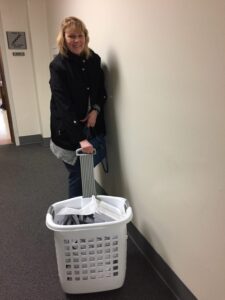Still Crusading for Kentucky ‘Kinship Care’ Families
Grandparents, ‘fictive kin’ save the state money. They could use some help themselves.

Get stories like this delivered straight to your inbox. Sign up for The 74 Newsletter
For Barry Shrout, raising four granddaughters is a role he willingly took on — and that he acknowledges is exhausting and expensive.
“The financial part of it is a big thing with me,” said Shrout, 66, a single grandfather from Maysville who has custody of the girls ages 10, 11, 13 and 17. “I have to daily watch every nickel and dime I spend.”
Grandparents like Shrout have prompted Norma Hatfield, of Elizabethtown, to renew her near-decade-long crusade for more help for such relatives, mostly grandparents, who are raising an estimated 59,000 Kentucky children in what’s commonly called “kinship care.”

Hatfield, president of Kinship Families Coalition of Kentucky, acknowledges Kentucky has adopted some changes meant to aid relatives raising children whose parents are unable to care for them or have lost custody because of neglect or abuse with addiction often a factor.
But Hatfield, who is raising two grandchildren, said more is needed to aid the many older relatives who have stepped in to raise children who likely would otherwise end up in foster care — at significant expense to the state.
“I communicate with so many caregivers and I keep hearing the same issues, the same struggles, and I don’t see a lot of change,” Hatfield said. “It’s been nine years. Why can’t we do better?”
Kentucky Youth Advocates, while commending state social services for changes meant to aid such caregivers, continues to seek more help for those, many on fixed incomes, who have taken children into their homes.
Shannon Moody, chief policy and strategy officer for the nonpartisan advocacy group, said recent reports of children sleeping in state social services offices in Kentucky for lack of a suitable placement as well as others sent out of state to residential centers or psychiatric hospitals suggest a “crisis” in the system.
Placing children with relatives or caregivers known as “fictive kin” — adults known and trusted by the child such as a neighbor or friend — could ease the strain, she said.
“Some of the recommendations we are making are making sure kids are with family or family-based care,” Moody said.
But Rep. Samara Heavrin, R-Leitchfield and committee co-chair, expressed reservations about more financial assistance to such caregivers without more oversight.
“It’s a very big ask for the General Assembly to give money out without any strings attached,” Heavrin said. “I understand your story… but we can’t just write a blank check, either.”
Hatfield and Moody said no one is asking for a blank check but said it’s clear more work is needed to help caregivers understand what they are taking on, what assistance is available and the expense involved.
“We can’t just leave them drained, completely drained,” Hatfield said.
‘Dropped like a hot potato’
Until 2013, the state offered a monthly payment of $300 per child to kinship care providers who took in children. By contrast, state-certified foster parents are paid about $750 a month.
But the state closed the kinship program to new applicants 10 years ago, citing budget pressures.
Since then, Kentucky has restored some assistance, prodded in part by a class-action lawsuit that successfully argued kinship caregivers were providing essentially the same services for free that foster parents provided for $750 or more per child per month.
Now, relatives can receive foster care payments if they agree to train and become certified by the state. Monthly payments range from the full amount per child to partial pay if the relatives can’t meet all requirements — for example, if the house isn’t large enough to meet state specifications.
But when the child moves from foster to permanent status, should the relative adopt or gain permanent custody, the payments stop.
“They are dropped like a hot potato,” Hatfield said. “You take what you can when you can.”
Good news for family, foster caregivers
One bright spot: a recent federal rule change will allow relatives to get full foster pay even if their homes don’t meet all licensing standards.
Hatfield said Kentucky officials are reviewing how to implement the change that would be “huge” for relative caregivers.
In more potential good news for such caregivers, Gov. Andy Beshear, in his Dec. 18 budget proposal, included $10 million a year over the next two years to increase money available to relatives who agree to take children in care of the state social service system. And his budget proposes another $9.8 million a year each year to increase foster care rates by 12% for all foster caregivers.
Hatfield said both steps would be enormously helpful in relieving the financial strain for families.
“I’m so grateful to the governor for the proposed funding in the budget for kinship and foster families,” she said. “It gives me and many others a renewed sense of hope.”
Hatfield said she and other advocates will work to convince lawmakers of the need for the funds as legislators begin drafting the state’s next two-year budget in the upcoming legislative session.
Other aid available to caregivers includes the Kentucky Transitional Assistance Program, which provides a modest monthly payment per child, Medicaid health coverage for the children, Supplemental Nutrition Assistance Program, or food stamps, and a “Kentucky Caregiver” program which offers an annual payment of $500 per child for expenses such as furniture, school supplies, clothes or other needs.
The child’s parents also may be required to pay child support to caregivers, though advocates say that can be hard to collect in cases where parents are experiencing addiction, are incarcerated or have left the state.
All of those are important, Hatfield said, but more ongoing aid is needed to help relative caregivers with costs. And she said much better communication is needed for relatives who often are forced to make snap decisions in a moment of crisis about children abruptly removed from homes by authorities.
An uninformed decision — such as agreeing to take temporary custody of children — can force relatives to forfeit aid such as foster payments available only to those who agree to accept them under a foster care arrangement with the state, she said.
And state officials don’t allow any changes after that initial decision.
Workers with the Cabinet for Health and Family Services are supposed to explain options and the cabinet has information, including a video on its website, but families need better, simple and clear explanations, Hatfield said.
“People are caught up in a time of stress and all they hear is, ‘You can take temporary custody or we can put them in foster care,’” Hatfield said. “They say, ‘Of course we’ll take custody.’ Once you check the box, you can’t change it.”
Hatfield and Kentucky Youth Advocates are urging several changes they believe would help.
Mileage reimbursement
Relatives who take in children, often from abusive or neglectful situations, find they are required to take children to a host of appointments for medical care and therapy for the trauma many have experienced. They also are required to take children to any visits with parents ordered by the court, which can be weekly.
While foster parents get mileage reimbursement, relative caregivers do not, even as they are required to drive children many miles per week for appointments.
Michelle Tynes, who lives in Graves County in Western Kentucky, said she had to drive hundreds of miles back and forth to Louisville with no reimbursement after one of several grandchildren she took in temporarily needed multiple medical procedures at Norton Children’s Hospital.
She was able to pay for it, but Hatfield said buying gasoline is a hardship for many relatives.
“This one is really a big deal for a lot of families,” Hatfield said.
Respite care
Relative caregivers are not eligible for outside care for children for their medical appointments or just a needed break for errands or other events although foster parents do get reimbursed for respite care.
Shrout, the Maysville grandfather, said a trusted woman from his church cared for his granddaughters when he had to stay overnight in the hospital for a heart procedure.
He said he’s grateful for the support from his church friends but said he wishes he had some of the same help as foster parents.
“The legislature seems to be bending over backwards to help foster parents instead of kinship parents like me,” Shrout said. “We’re treated differently than those people are and it’s not fair.”
Guardianship payments
Relatives often take children under temporary arrangements in which they can get foster payments. But if the court determines the child can’t return to the parents, the relative then may adopt or obtain permanent custody.
That stops foster payments.
Advocates would like to see the state take advantage of federal funds available through a guardianship arrangement where the relative is eligible for payments as a guardian until the child turns 18.
Hatfield said state social service officials have told her they are investigating this possibility and she hopes it will become available in Kentucky.
Also, while foster children are eligible for free tuition at a state college in Kentucky, kinship children are not.
Hatfield said that would be a big help to caregivers of children nearing college age.
Opioid settlement funds?
Hatfield says she doesn’t know how much all these proposals would cost or how they would be implemented.
For that reason, she said, she’s urging lawmakers to create a task force that would study the situation and try to get a handle on the scope of the need and money required to pay for any changes.
“As much as we’ve been talking for the last nine years about kinship care, why wouldn’t we have a task force to see what the needs are,” she said.
And Hatfield said she has one final thought: Why not use some of the millions of dollars Kentucky has recovered in settlements with pharmaceutical companies over the opioid addiction crisis?
Addiction is what caused many parents to lose custody of their children, Hatfield said, asking:
“Why are we not using some of these opioid settlement funds for kinship caregivers?”
Kentucky Lantern is part of States Newsroom, a network of news bureaus supported by grants and a coalition of donors as a 501c(3) public charity. Kentucky Lantern maintains editorial independence. Contact Editor Jamie Lucke for questions: [email protected]. Follow Kentucky Lantern on Facebook and Twitter.
Get stories like these delivered straight to your inbox. Sign up for The 74 Newsletter

;)